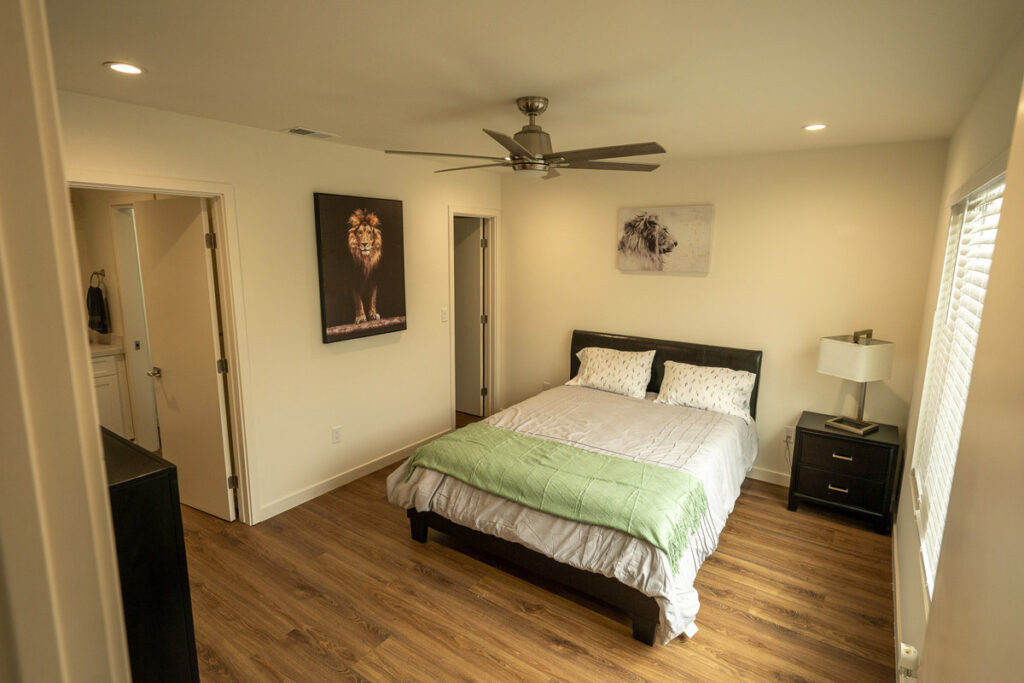Structured sober living facilities offer a supportive environment for individuals in recovery. Often a next step for individuals after detox and inpatient treatment, structured living homes offer a safe space where residents can continue their recovery journey, integrating newfound coping skills and habits into their daily lives while receiving ongoing support from peers and staff members. At Experience Structure Living, this is what we provide: a bridge to independence for people in recovery.
Of course, structured sober living facilities aren’t one-size-fits-all. Different types of people and mental health conditions may benefit more from this type of living arrangement than others. The key is to find the one that’s the right fit for you by considering your unique needs, the different structured living options available, and what environment will be most conducive to your lasting recovery. Let’s dive into the benefits of structured sober living and how to find the right fit.
What Is “Structured Living”?
Structured living or supportive housing provides a safe environment for individuals transitioning from more intensive treatment. Residents follow rules, attend group sessions, and engage in activities promoting responsibility and accountability. These residences offer counseling, life skills training, and other services tailored to residents’ needs. The goal is successful reintegration into society by fostering independence and preventing relapse.

Types of of People & Mental Health Conditions That Thrive in Structured Living
The structure and support that sober living homes provide is immensely helpful in the journey of long-lasting recovery. It’s particularly helpful for the following individuals:
- People Leaving Inpatient Mental Health Treatment: Mental health recovery can be challenging, and having a structured environment to come home to can be immensely beneficial. Experience Structure Living offers accountability, peer support, and access to resources that can help individuals navigate the early days of recovery.
- Those with Co-Occurring Disorders: Many individuals struggling with addiction also have co-occurring mental health disorders such as depression, anxiety, or PTSD. Structured living facilities often have staff trained to support individuals with co-occurring disorders, providing access to therapy, medication management, and other necessary resources.
- Individuals Reintegrating into Society: For individuals transitioning from treatment programs back into society, structured living can provide a vital bridge. These facilities offer a supportive environment where individuals can relearn life skills, rebuild relationships, and establish a foundation for long-term recovery.
- Those Seeking Community and Support: Recovery is often more successful when individuals have a strong support system. Structured living fosters a sense of community among residents, providing opportunities for peer support, group therapy, and social activities.
While structured living can be beneficial for many individuals, it may not be the right fit for everyone. Individuals who require intensive medical or psychiatric care may need a higher level of support than what is typically available in these facilities. Additionally, individuals who are not committed to their recovery or who are unwilling to adhere to the rules and structure of the program may struggle in this environment.

Types of Structured Living Housing
Structured living housing comes in various forms to meet the diverse needs of individuals transitioning from institutional settings. Some common types include:
- Halfway Houses: Residential facilities providing a transitional environment for individuals leaving incarceration, offering support, supervision, and reintegration services.
- Sober Living Homes: Substance-free residences offering a supportive environment for individuals in recovery from addiction, emphasizing sobriety, accountability, and peer support.
- Group Homes: Residential settings for individuals with specific needs, such as mental health challenges or developmental disabilities, providing structured support and supervision.
- Transitional Living Programs: Facilities offering temporary housing and supportive services to help individuals develop independent living skills and secure permanent housing.
- Supportive Housing: Long-term residences providing stable housing combined with supportive services like counseling, life skills training, and employment assistance for individuals facing homelessness or other challenges.
The Importance of Structure and Routine in Recovery
Structure and routine are vital components of recovery, particularly in overcoming addiction. Consistent schedules offer stability and predictability, reducing stress and minimizing relapse triggers. A structured environment replaces chaotic behaviors with purposeful activities, fostering a sense of order and control. Routine supports the development of healthy habits like regular exercise, balanced nutrition, and sufficient sleep, which are crucial for physical and mental well-being. Additionally, following rules and schedules promotes accountability and responsibility, essential for sustaining sobriety.
In our structured living housing and recovery programs, daily routines include group therapy sessions, skill-building activities, and recreational therapy, reinforcing positive behaviors and social connections. These routines create a supportive framework for individuals to rebuild their lives, learn coping mechanisms, and develop the skills necessary for long-term recovery.
Benefits of Living in Structured Living Housing
Here are some of the benefits of choosing a structured living facility:
- Supportive Environment: Structured living housing provides a supportive community of individuals with shared experiences, fostering a sense of understanding and camaraderie.
- Accountability: Residents adhere to rules and routines, promoting accountability and responsibility, essential for maintaining sobriety and positive behavior.
- Structured Schedule: A daily schedule for recovering addicts offers stability, reducing stress and creating a framework for individuals to rebuild their lives with purpose and direction.
- Skill Development: Residents have access to programs and services promoting life skills, such as job training, financial management, and coping strategies, contributing to long-term success.
- Reduced Isolation: Living in a communal setting decreases isolation, encouraging social interaction and support, crucial for emotional well-being.
- Safe Transition: For those leaving institutional settings, structured housing provides a gradual transition to independent living, reducing the risk of relapse.
- Opportunity for Growth: Residents can focus on personal growth, self-discovery, and rebuilding relationships, facilitated by the supportive and structured environment.
What To Expect at Experience Structured Living
Expect a supportive environment with rules promoting accountability. Daily routines include group therapy, life skills training, and recreational activities. Residents commit to adhering to curfews and participating in household responsibilities. Peer support fosters camaraderie, aiding in the recovery journey. Overall, Experience Structured Living provides stability, guidance, and opportunities for personal growth in a safe and supportive setting.
Explore Our Structured Sober Living Program in California
Take the next step toward a more independent and fulfilling life. Explore Experience Structured Living today and discover the support you need for lasting recovery.
Frequently Asked Questions About Structured Living in San Diego
What are the four types of recovery?
The four types of recovery are often categorized as:
- Physical Recovery: This refers to the process of detoxification and physical healing from the effects of substance abuse or addiction.
- Emotional Recovery: Emotional recovery involves addressing the underlying emotional issues and learning healthy coping mechanisms to manage emotions without turning to substances.
- Social Recovery: Social recovery focuses on rebuilding relationships, establishing a support network, and reintegrating into society in a positive and healthy way.
- Spiritual Recovery: Spiritual recovery does not necessarily refer to religious beliefs but rather to finding meaning, purpose, and connection in life beyond substance abuse. It involves exploring one’s values, beliefs, and sense of purpose.
What types of programs are offered in structured living facilities?
Programs offered in structured living facilities can vary but often include therapy sessions, life skills training, vocational training, educational programs, and recreational activities.
Who can benefit from structured living?
Structured living can benefit individuals recovering from addiction, mental illness, or those transitioning from incarceration. It provides a supportive environment where individuals can work toward their goals and develop the skills necessary for independent living.
How long do people typically stay in structured living housing?
The length of stay in structured living housing can vary depending on individual needs and program requirements. Some individuals may stay for a few months, while others may stay longer, depending on their progress and goals.
What are the rules and guidelines in structured living housing?
Rules and guidelines in structured living housing often include requirements related to sobriety, curfews, participation in programs and activities, maintaining a clean and respectful environment, and adhering to community guidelines.
Is structured living housing the same as a halfway house or a sober living home?
Structured living housing can encompass various types of residential arrangements, including halfway houses, sober living homes, group homes, and transitional housing programs. While they may have similar goals of providing support and structure, the specific services and regulations can vary between different types of structured living facilities.




